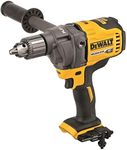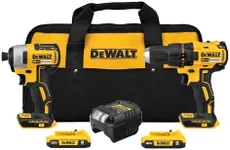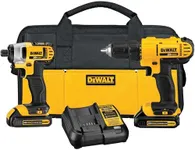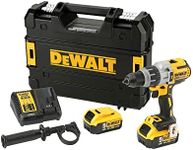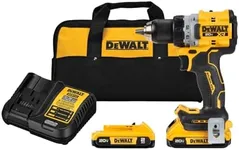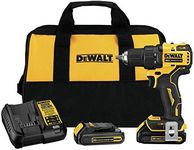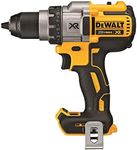Buying Guide for the Best Dewalt Cordless Drills
When choosing a DeWalt cordless drill, it's important to consider the specific tasks you plan to undertake. Cordless drills offer the convenience of mobility and ease of use, making them ideal for both professional and DIY projects. Understanding the key specifications will help you select a drill that meets your needs, whether you're working on heavy-duty construction or simple home repairs.VoltageVoltage in cordless drills indicates the power of the drill. Higher voltage means more power, which is useful for heavy-duty tasks like drilling into hard materials. Drills typically range from 12V to 20V. For light tasks such as assembling furniture or drilling into softwood, a 12V drill is sufficient. For more demanding tasks, like drilling into metal or masonry, a 20V drill would be more appropriate. Consider the types of projects you will be working on to determine the right voltage for you.
Battery TypeThe battery type affects the drill's performance and longevity. Most modern cordless drills use Lithium-Ion (Li-Ion) batteries, which are lighter, charge faster, and have a longer lifespan compared to older Nickel-Cadmium (NiCd) batteries. Li-Ion batteries are generally the best choice for most users due to their efficiency and reliability. If you plan to use the drill frequently or for extended periods, ensure it comes with a high-capacity Li-Ion battery.
Chuck SizeThe chuck size determines the maximum diameter of the drill bit that the drill can accommodate. Common sizes are 3/8 inch and 1/2 inch. A 3/8 inch chuck is suitable for most household tasks and light-duty work, while a 1/2 inch chuck is better for heavy-duty applications and larger drill bits. Consider the types of projects you will be undertaking and choose a chuck size that can handle the drill bits you plan to use.
Speed SettingsSpeed settings in a drill allow you to adjust the rotation speed of the drill bit. Most drills have two speed settings: low speed for driving screws and high speed for drilling holes. Some models offer variable speed control for more precision. If you need versatility for different tasks, look for a drill with multiple speed settings. This feature is particularly useful if you plan to work with a variety of materials.
TorqueTorque is the force that the drill can apply to turn an object, such as a screw or drill bit. Higher torque is beneficial for driving screws into tough materials. Drills with adjustable torque settings allow you to control the force applied, which is useful for preventing overdriving screws or damaging materials. If you frequently work with different materials, a drill with adjustable torque settings will provide the flexibility you need.
Weight and ErgonomicsThe weight and ergonomics of a drill affect how comfortable it is to use, especially for extended periods. Lighter drills are easier to handle and reduce fatigue, which is important for prolonged use. Ergonomic designs with comfortable grips can also enhance usability. If you plan to use the drill for long durations or in awkward positions, prioritize models that are lightweight and have ergonomic features.

